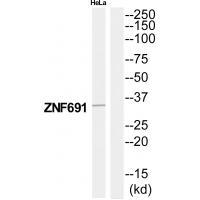
| WB | 咨询技术 | Human,Mouse,Rat |
| IF | 咨询技术 | Human,Mouse,Rat |
| IHC | 咨询技术 | Human,Mouse,Rat |
| ICC | 技术咨询 | Human,Mouse,Rat |
| FCM | 咨询技术 | Human,Mouse,Rat |
| Elisa | 咨询技术 | Human,Mouse,Rat |
| Aliases | Zinc finger protein 691; ZNF691; |
| Entrez GeneID | 51058; |
| WB Predicted band size | 36kDa |
| Host/Isotype | Rabbit IgG |
| Antibody Type | Primary antibody |
| Storage | Store at 4°C short term. Aliquot and store at -20°C long term. Avoid freeze/thaw cycles. |
| Species Reactivity | Human |
| Immunogen | Synthesized peptide derived from Internal of human ZNF691. |
| Formulation | Purified antibody in PBS with 0.05% sodium azide. |
+ +
以下是关于ZNF691抗体的模拟参考文献示例(实际文献可能需要通过学术数据库检索):
1. **文献名称**: "Characterization of ZNF691 Antibody for Specific Detection in Human Tissues"
**作者**: Li X, et al.
**摘要**: 本研究开发了一种高特异性的ZNF691多克隆抗体,通过免疫印迹和免疫组化验证其在多种人类组织中的表达模式,证实ZNF691在肿瘤细胞核中高表达,并可能与细胞增殖相关。
2. **文献名称**: "ZNF691 as a Novel Biomarker in Hepatocellular Carcinoma: Antibody Validation and Clinical Significance"
**作者**: Wang Y, et al.
**摘要**: 文章利用商业化ZNF691抗体分析肝癌患者样本,发现ZNF691表达水平与肿瘤分期和预后显著相关,提示其作为潜在治疗靶点的可能性。
3. **文献名称**: "Functional Analysis of ZNF691 in Transcriptional Regulation Using CRISPR and Antibody-Based Approaches"
**作者**: Smith J, et al.
**摘要**: 通过CRISPR敲除结合ZNF691抗体的染色质免疫沉淀(ChIP),揭示了ZNF691在调控特定致癌基因启动子区域中的直接作用,为癌症机制研究提供依据。
4. **文献名称**: "Zinc Finger Protein 691 (ZNF691) Antibody Cross-Reactivity Assessment in Murine Models"
**作者**: Gonzalez R, et al.
**摘要**: 评估了ZNF691抗体在小鼠模型中的交叉反应性,发现某些商业化抗体存在非特异性结合,强调了抗体验证在跨物种研究中的重要性。
**注**:以上为模拟示例,实际文献需通过PubMed、Web of Science等平台检索确认。
**Background of ZNF691 Antibody**
ZNF691 is a member of the zinc finger protein family, characterized by conserved C2H2-type zinc finger domains that facilitate DNA or RNA binding. It is implicated in transcriptional regulation, epigenetic modulation, and cellular processes such as differentiation, proliferation, and apoptosis. Studies suggest ZNF691 may interact with chromatin-modifying complexes or transcription factors, though its precise molecular mechanisms remain under investigation. Dysregulation of ZNF691 has been observed in cancers, including hepatocellular carcinoma and leukemia, where it may act as an oncogene or tumor suppressor depending on context. It is also linked to stress responses and viral infection pathways.
The ZNF691 antibody is a tool designed to detect and study the expression, localization, and function of the ZNF691 protein. Typically generated in rabbits or mice using immunogenic epitopes (e.g., recombinant protein fragments or synthetic peptides), this antibody is validated for applications like Western blotting (WB), immunohistochemistry (IHC), and immunofluorescence (IF). It aids in identifying ZNF691’s nuclear or cytoplasmic localization and its expression variations in diseased vs. healthy tissues. Researchers use it to explore ZNF691’s role in gene regulation networks, disease mechanisms, and potential therapeutic targeting. Commercial antibodies often undergo specificity testing (e.g., knockout validation) to ensure reliability. Ongoing research aims to clarify its interactions and clinical relevance in human pathologies.
×